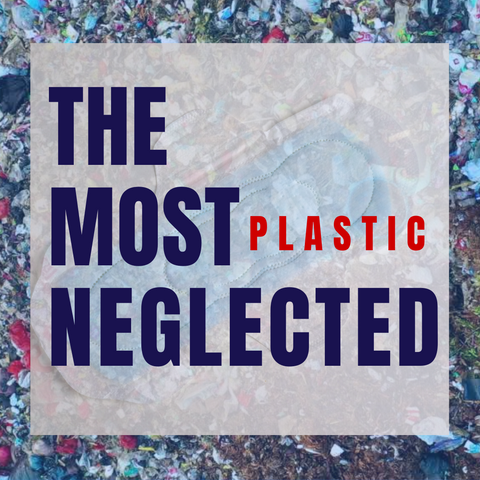Introduction:
Did you know that the face wash which exfoliates our skin better is one of the prominent causes of plastic pollution? That the tiny colorful pellets floating in our care products are called microbeads? Also, did you know that regular sanitary pads which we use every month contain nearly 90% of plastic?
Plastics have been sneaking into our lives for years now, be it through some strategic marketing techniques or simply by easing our workload by handing us a shiny poly-bag. It has managed to wrap us into its grab because of its comfort and compactness; people are drawn towards it as it is easy to use and carry. Due to the versatile nature of plastics, they became so widely accepted. From plastic water bottles to straws, it rules over the entire market. But, now, it is time to move on from plastics to a better material because plastics have started to cause problems.
Polythene bags may look enticing when you maxed your credit card at a shop but remember that the polythene is not good for us in the long run. Around 12 million tonnes of plastic end up in the oceans every year and this plastic is broken down into microbeads and microplastics that further harms aquatic life. Annually, about 100,000 marine mammals and turtles and 1 million seabirds are killed by marine plastic pollution. Not just water but plastics also harm the air. Producing 1 tonne of plastic raises to 2.5 tonnes of carbon dioxide.
To put an end to this, the government has decided to ban single-use plastics from 2022 in India.
“The manufacture, import, stocking, distribution, sale and use of… single-use plastic, including polystyrene and expanded polystyrene commodities shall be prohibited with effect from the 1st July 2022,” said the Ministry notification on the Plastic Waste Management Amendment Rules, 2021.

Plastic ban and period pads:
This ban will apply only to plastics that are not compostable. This will include a number of items ranging from earbuds with plastic sticks to straws. Even though single-use plastics are being banned, regular disposable period pads are still not a part of the ban regardless of the fact that they contain nearly 90% of plastics and are non-biodegradable. According to the Menstrual Hygiene Alliance Of India, 36% of menstruators in India use disposable sanitary pads, all while if a menstruator uses 8 sanitary pads (approx.) per menstrual cycle, it equates to 12.3 billion sanitary pads waste from India alone most of which are not biodegradable. These period plastics can take about 600-800 years to just break down into microplastics.
In order to curb this problem of period plastics, all non-sustainable products like regular period pads should be heavily taxed for an easy switch towards the end goal of banning them.Another positive step that can be taken by the government is to support and favor the manufacturers of biodegradable menstrual pads and other sustainable products. This will promote biodegradable pads over plastic pads and ultimately reduce plastic pollution.

Conclusion:
A plastic ban is an impactful step towards a greener future with no plastic pollution. There is also an urgent need towards recognizing all products that contribute towards plastics and plastic period products are one of them. It is time to turn to eco-friendly menstrual pads like Saathi pads that are 100% biodegradable and compostable and help reduce period plastics which is also a part of the romanticism of plastics. Single-use plastics have been dumping on environmental problems throughout the landscape and hence, it is high time that we go plastic-free.
Continue reading…
- Plastic-free July Series Part-1
- Impact of Plastics on Environmental injustice
- The Curious Case of Plastics
About Saathi:
Saathi , an award-winning social venture has patented technology to convert agri-waste into absorbent materials. It is known for its 100% biodegradable and compostable sanitary pads made from banana and bamboo fibres. Saathi pads are better for the body🩸, community 🌎 and environment 🌱. We are on a mission to make products sustainably and responsibly.
We are recognized by the UNESCO Green Citizens project, University of St. Andrews, Solar Impulse Foundation, and Global Cleantech Innovation Program among others for our innovative, social impact, and sustainable work. We are working towards 8 United Nations Sustainable Development Goals (SDGs).
Check out a short video of our story here and follow us at @saathipads on Facebook, Twitter, Instagram, Linkedin, and Youtube to know how menstruation can be sustainable and stigma-free.

